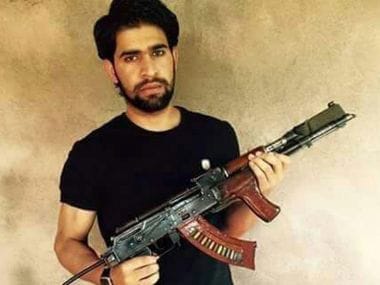‘Soldiers’ for Ghazwa-tul-Hind ‘Betrayed’ by Pakistan: Global links of militancy in Kashmir

More than a dozen men armed with assault rifles marched in the backdrop of snowscape in a video circulated online, announcing them as the soldiers for Ghazwa-e-Hind, the prophesied battle for India in Islamic traditions. A subsequent frame closes in on three jihadists, the snowscape missing, two flags behind them announced their allegiance to Al-Qaeda in the Indian subcontinent, or the AQIS.
The jihadist in the middle, unmasked but his face pixelated beyond recognition, identified himself as Faisal Ishfaq Bhat, a resident of Srinagar in the Kashmir Valley, and indicated that he was in Afghanistan. The nearly thirty minute-long address that used Quranic justification for jihad but sharply turned attention to a south Asian sentiment increasingly finding resonance in Kashmir: Pakistan’s betrayal of jihad for its own interests.
It was this betrayal that was cited by Musa when he rebelled against the pro-Pakistan Hizbul Mujahideen and aligned his splinter group with the Afghanistan-based AQIS, naming it the Ansar Ghazwatul Hind. The video featuring Bhat along with the a rare audio eulogy for Zakir Musa released separately, last week, by senior jihadist leader of the AQIS, Ustadh Usama Mehmood, is the strongest evidence of a link between Kashmiri and global jihadists.
Mehmood said that Musa sought guidance from “jihadi scholars in matters of jihad”, an indication that Ansar chief was in contact with the Al Qaeda, at least in matters of consultation and advice, and ranked the Kashmiri jihadist at par with Osama Bin Laden, the mastermind behind the September 2001 attacks in the United States, and the Afghan Taliban’s Mullah Muhammad Omar, a rare honour for a jihadist.
A geopolitical game
Portrayed as the fortress of Islam in south Asia, Pakistan was a safe haven for jihadist groups operating in the region, primarily focussed on Afghanistan and Kashmir. However, following an increasing scrutiny in the wake of the September 2001 attacks in the United States, Pakistan cracked the whip on jihadist outfits, including those operating in Kashmir, leading to a sense of betrayal.
The same year, Bhat had crossed over to Pakistan and, in what could be called a case of the grass seeming greener on the other side, began being disillusioned. “The reality about the (Pakistan) army that aides the jihad in Kashmir and the ISI began to be revealed to us from the moment we reached (Pakistan),” he said. “We also saw how much Islam was in practice here.”
Claiming to have witnessed closely how jihadist outfits were “helpless” before and taken “hostage” by the “hypocrite” Pakistani intelligence services, Bhat was in a state of “mixed feelings”.
National interest and foreign policy was “dearer” to Pakistan than the actual objectives of jihad, according to Bhat. He said that Pakistan saw jihad as merely “a policy for international bank balances and strategic depth”, and a policy aimed at, among other regional objectives, keeping pressure on India. “It’s a game, a part of the policy,” Bhat denounced Pakistan. “To achieve these goals they need human resources, they need foot soldiers. And for that, they used a cause for which the conscientious Muslims of the Ummah could be manipulated.”
Bhat said that his group was prevented from carrying out attacks in Kashmir as it would lead to “deterioration of the political situation in Pakistan”. If the numbers of jihadists killed in Kashmir is an indicator of Pakistan controlling the tempo, according to the figures compiled by the South Asia Terrorism Portal, from 2,850 jihadists killed by Indian forces in 2001, the numbers fell to 84 in 2012. It is around this time that, Bhat said, Pakistan’s intelligence services caused rifts within the various jihadist outfits operating in Kashmir and the subsequent breakaway factions, many on sectarian lines, exposing internal differences leading to infighting. By 2013, the number of active jihadists in Kashmir nosedived to only about 78, the lowest since the eruption of violence.
Resonance in Kashmir
Feeble frictions began emerging on the ground since Adil Mir took control of the ‘jihad’ in 2010 and later the death of his cousin Burhan Wani in 2016 galvanised the resurgence of a strong sympathy for jihadists and mobilised the civilian population against the Indian state, taking away the levers of control from Pakistan as smaller modules of the jihadists outfits also began operating independently.
The general public in the Valley and sympathisers of the jihadist groups remained isolated from these events post the September 2001 attacks owing to the lack of reporting in the local press, that is seen by observers as inclined towards Pakistani interests. The emergence of social media ensured that Musa’s rebellion could not be brushed under the carpet. At the same time, the Islamic State emerged, professing links to the Afghanistan-based divison of the jihadist outfit that had overtaken Al-Qaeda as the leading global jihadist outfit since 2014.
Musa’s rebellion paved the way for many other jihadists to defect to his AQIS-affiliated outfit. “Whoever gives pinpoint (locations), becomes dear to Allah…I don’t understand what is going on,” rued a Pakistani jihadist known as Abu Dujana in a 2017 conversation with Zakir Musa, recorded some time after the latter’s rebellion against the pro-Pakistan leadership in May, but a month before the announcement of the Ansar Ghazwatul Hind in July and released three months after Dujana’s death in August. Dujana was among the first jihadists in Kashmir to defect to Al-Qaeda.
Another Pakistani jihadist broke his silence to join Musa and was eventually killed in a gunfight on the outskirts of Srinagar in March 2018. In a video released after his death, Abu Hamas said that he wanted to “free the jihad” from “taghuti nizam” — man-made ruling systems considered idolatrous — after witnessing Pakistan’s duplicity since his recruitment in 2012. Later in the video, Hamas spoke of doubts over a crackdown in Pakistan against those “who speak of khilafat and shariat” while Kashmiri jihadists who were loyal to Pakistan’s interests were receiving “security and protocol” from the Pakistani state. “A lot of questions would come, but we would console ourselves saying we were going to help the oppressed in Kashmir,” he said.
Hamas mentioned senior figures of the Hizbul Mujahideen and Jamaat-e-Islami based in Pakistan having defected to Al-Qaeda as reassurance for his decision. Prominent among those who defected was the Pakistan-occupied-Kashmir-based Hizb trainer who became a senior Al Qaeda operative, Ahsan Aziz. Hamas also cited another slain jihadist, Afzal, who defected from the Al-Badr over apprehensions that the jihad in Kashmir had been reduced to “agency work”.
A call to arms
“There are attempts to end this jihad and put the mujahideen in cold storage,” Musa had said in a 15-minute video released on 7 April this year, attacking the Pakistan premier Imran Khan’s statement on “dialogue on terrorism” in the wake of the Pulwama suicide bombing, the most significant attack in the three decade-long violence in Kashmir. Buoyed by the perseverance of the Afghan Taliban and the United States’ pulling out of troops from the region, Musa also mentioned that more jihadists were joining them with each passing day.
In an audio released after Zakir Musa’s death, the militant leader is heard imploring a Hizb jihadist to seek knowledge even if he does not wish to quit his outfit. His advice to the Hizb jihadist was, “Find the truth, without looking up to individuals, and you will yourself see the righteous (path).”
In the AQIS eulogy for Musa, Mehmood said that the “mujahideen in Afghanistan were overwhelmed with grief” over his death and that now was a test of faith given that “Pakistan had long traded Kashmiri Muslims” for its interests. If the Kashmir jihad was dependent on Pakistan intelligence services, Mehmood said, “azadi would never be achieved even if sacrifices go one for a thousand years”.
Bhat’s first public statement, too, echoed Musa and Mehmood: “We see in the mujahideen in general and their leaders in particular, a yearning to free Kashmir and enforce sharia,” he says. “The mujahideen here are desperate to meet their brothers and in the near future will join their brothers in Kashmir and will target the oppressive (Indian) army and police from the trenches of Kashmir”. Source: https://www.firstpost.com/india/betrayed-by-pakistan-jihadists-seek-alliances-in-kashmir-afghanistan-recent-audio-eulogising-zakir-musa-highlights-global-links-of-militancy-6788031.html






